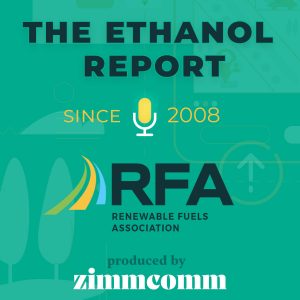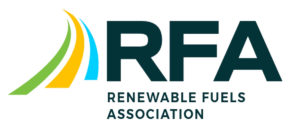The American Coalition for Ethanol (ACE) honored two exceptional ethanol advocates for their contributions to the industry with an awards video during the 33rd annual ACE conference held virtually in conjunction with the Fuel Ethanol Workshop (FEW) and Expo this week.
 Bob Scott, who served as the ACE Board President from 1999 to 2009 representing Poet Ethanol Products, was recognized with ACE’s most prestigious honor, the Merle Anderson Award, named after the organization’s founder. ACE CEO Brian Jennings and Senior Vice President Ron Lamberty presented Scott with the award.
Bob Scott, who served as the ACE Board President from 1999 to 2009 representing Poet Ethanol Products, was recognized with ACE’s most prestigious honor, the Merle Anderson Award, named after the organization’s founder. ACE CEO Brian Jennings and Senior Vice President Ron Lamberty presented Scott with the award.
“For me, it was a labor of love,” Scott said. “When I look back at my time on the ACE board and the enactment of the RFS, it’s one of my favorite times in my life; we challenged ourselves and everyone else. Merle Anderson convinced me that ethanol was the right thing to do and the ACE Board was truly the best board I’ve ever been a part of.”
 Jan tenBensel, Nebraska farmer and chair of the Nebraska Ethanol Board, received this year’s Grassroots Award for his unyielding and humble advocacy, notably his work with the University of Nebraska-Lincoln to produce thousands of gallons of hand sanitizer for donation to help address the shortage during the health pandemic. ACE Board members Roger Berry, NEB Administrator, and Scott McPheeters of KAAPA Ethanol presented tenBensel with the award.
Jan tenBensel, Nebraska farmer and chair of the Nebraska Ethanol Board, received this year’s Grassroots Award for his unyielding and humble advocacy, notably his work with the University of Nebraska-Lincoln to produce thousands of gallons of hand sanitizer for donation to help address the shortage during the health pandemic. ACE Board members Roger Berry, NEB Administrator, and Scott McPheeters of KAAPA Ethanol presented tenBensel with the award.
“Jan truly is the definition of grassroots activism when it comes to ethanol,” Berry said. “Within one week, he helped pull together a production and distribution facility to provide hand sanitizer to the state of Nebraska and beyond.”
“He loves to learn and he’s generous with his time,” McPheeters added. “He’s the type of guy you want on your team.”
Congratulations to two very deserving ethanol advocates and listen to their awards presentations and remarks here:
ACE 2020 Merle Anderson Award presentation to Bob Scott (7:59)
ACE 2020 Grassroots Award presentation to Jan tenBensel (6:38)
 Last week brought a flurry of good news for the ethanol industry in three major areas – exports, expansion of higher blends, and protecting the renewable fuel standard.
Last week brought a flurry of good news for the ethanol industry in three major areas – exports, expansion of higher blends, and protecting the renewable fuel standard. 

 Bob Scott, who served as the ACE Board President from 1999 to 2009 representing Poet Ethanol Products, was recognized with ACE’s most prestigious honor, the Merle Anderson Award, named after the organization’s founder. ACE CEO Brian Jennings and Senior Vice President Ron Lamberty presented Scott with the award.
Bob Scott, who served as the ACE Board President from 1999 to 2009 representing Poet Ethanol Products, was recognized with ACE’s most prestigious honor, the Merle Anderson Award, named after the organization’s founder. ACE CEO Brian Jennings and Senior Vice President Ron Lamberty presented Scott with the award. Jan tenBensel, Nebraska farmer and chair of the Nebraska Ethanol Board, received this year’s Grassroots Award for his unyielding and humble advocacy, notably his work with the University of Nebraska-Lincoln to produce thousands of gallons of hand sanitizer for donation to help address the shortage during the health pandemic. ACE Board members Roger Berry, NEB Administrator, and Scott McPheeters of KAAPA Ethanol presented tenBensel with the award.
Jan tenBensel, Nebraska farmer and chair of the Nebraska Ethanol Board, received this year’s Grassroots Award for his unyielding and humble advocacy, notably his work with the University of Nebraska-Lincoln to produce thousands of gallons of hand sanitizer for donation to help address the shortage during the health pandemic. ACE Board members Roger Berry, NEB Administrator, and Scott McPheeters of KAAPA Ethanol presented tenBensel with the award. USDA Undersecretary Steve Censky gave one of his last addresses in his current role to the
USDA Undersecretary Steve Censky gave one of his last addresses in his current role to the  The House Committee on Energy and Commerce this week introduced the Clean Economy Jobs and Innovation Act, which contains provisions requiring more transparency and accountability in EPA’s process for evaluating small refinery exemption requests under the Renewable Fuel Standard. The provisions are based on the Renewable Fuel Standard Integrity Act, introduced last year by
The House Committee on Energy and Commerce this week introduced the Clean Economy Jobs and Innovation Act, which contains provisions requiring more transparency and accountability in EPA’s process for evaluating small refinery exemption requests under the Renewable Fuel Standard. The provisions are based on the Renewable Fuel Standard Integrity Act, introduced last year by  “In recent years, the Environmental Protection Agency has granted dozens of small refinery exemptions, waiving billions of gallons of biofuel from RFS blending requirements,” said Rep. Peterson. “The provisions of my bill will require EPA to pull back the curtain and show the American people how they justify granting these waivers that have greatly impacted profitability for biofuels producers and farmers across the country.”
“In recent years, the Environmental Protection Agency has granted dozens of small refinery exemptions, waiving billions of gallons of biofuel from RFS blending requirements,” said Rep. Peterson. “The provisions of my bill will require EPA to pull back the curtain and show the American people how they justify granting these waivers that have greatly impacted profitability for biofuels producers and farmers across the country.”
 As part of the virtual
As part of the virtual  The virtual
The virtual 
 Biodiesel producers are just as happy as ethanol producers with the EPA decision to deny retroactive small refinery exemption petitions.
Biodiesel producers are just as happy as ethanol producers with the EPA decision to deny retroactive small refinery exemption petitions.  The ethanol industry was pleased to hear Monday that the
The ethanol industry was pleased to hear Monday that the